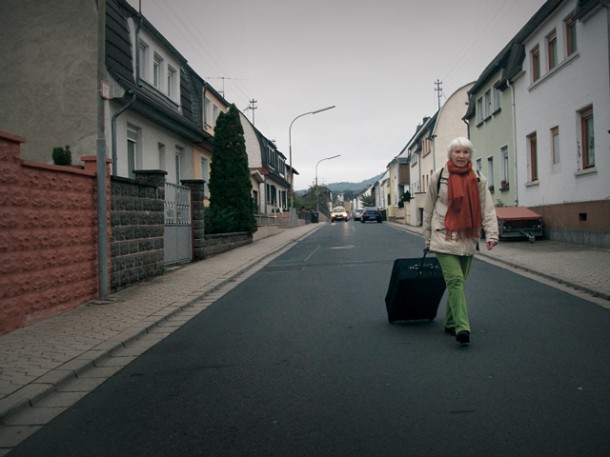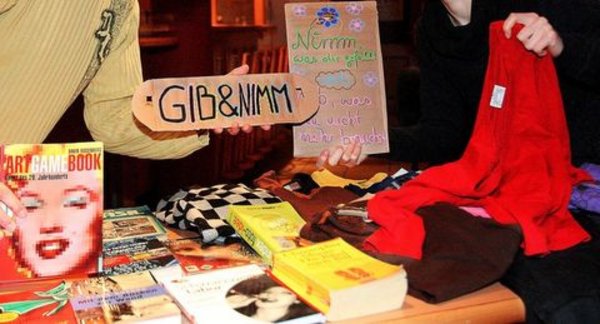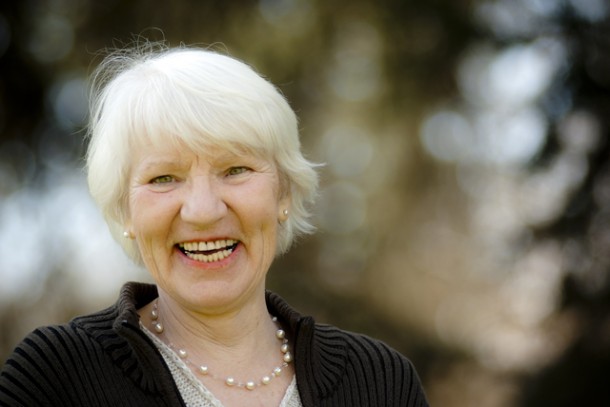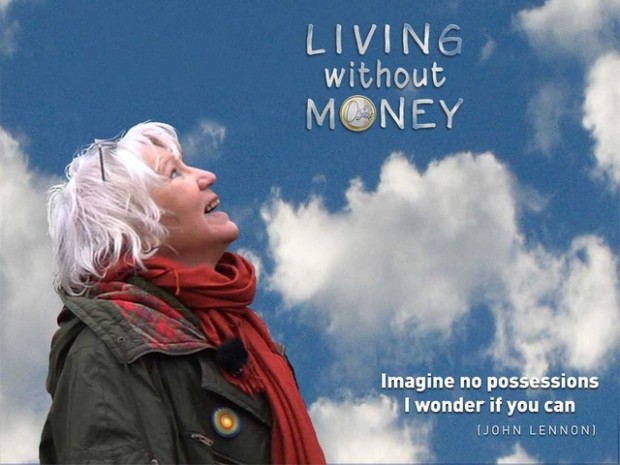
Heidemarie Schwermer, a 69-year-old woman from Germany, gave up using money 15 years ago and says she’s been much happier ever since.
Dortmund, Germany – Former school teacher and psychotherapist, Heidemarie Schwermer, is a 69-year-old mother of two and grandmother. She has been living money-free for the last 15 years, proving you don’t need money to live a healthy, happy, and fulfilling life.
Schwermer moved to Dortmund 22 years ago with her two children after ending a difficult marriage, and it didn’t take long before she started to notice the area’s homeless population. Then a middle-aged secondary school teacher, she eventually decided to open up a shop called “Gib und Nimm”, or “Give and Take”.
Gib und Nimm, which eventually became a local phenomenon, allows people to trade items or services with one another with no cash exchange involved. Clothing can be exchanged for kitchen appliances, car services can be exchanged for plumbing services, and so forth.
The original idea for Gib und Nimm was to help the local homeless population by giving them access to food, clothing, housing, and anything else they should need in exchange for their services. Schwermer believes the homeless doesn’t need money to be accepted into society, but instead a chance to empower themselves by using their personal skills in useful ways. The idea didn’t take off with Dortmund’s homeless population at first, many of which expressed that they didn’t feel a middle-class educated woman could relate to their situation. This got Schwermer thinking.
She began to realize she was living with a lot of useless things she didn’t need, and with this conclusion she decided not to buy anything else unless she gave something away. Soon after that she realized she was unhappy with her career as well, and decided to try different jobs, such as washing dishes.
By 1995, after her children had grown and moved away, Schwermer was spending next to nothing. Through Gib und Nimm, she had access to nearly everything she needed to survive, and a year later Schwermer decided to conduct an experiment—she would live without money altogether.
The experiment was originally meant to last a year, however Schwermer’s life changed so drastically for the better, she decided to continue. 15 years later, she still lives by her principles. Through the Gib und Nimm swap shop she still has access to everything she needs, and in exchange for housing, she does various work and chores. Not only is this economically ideal, but it offers her a chance to travel, and build lasting relationships.
Schwermer has written two books about her experiences, and 100% of the proceeds go to charity.
There are some articles on this grandmother of three that have clearly expressed annoyance with the way she has chosen to live her life, and some who even express anger. In general, however, it would seem most have a certain appreciation for the simple life she has chosen for herself.
“I grew tired and annoyed with just how greedy and consuming society was and is,” Schwermer stated in an interview with the Australian Times.
All of her belongings can fit into a single-back suitcase, and a rucksack. She has 200 Euros set aside as emergency funds, and any another other cash she comes across she gives away. At nearly 70-years-old, Heidemarie Schwermer says she’s happier, healthier, and better off than ever before.
Sources:
Froelich, Amanda. True Activist. Feb 23, 2015. (http://www.trueactivist.com/shes-69-and-hasnt-used-money-for-15-years-and-has-never-been-happier/)
Stevens, Isis. Liberty Voice. Oct 22, 2014. (http://guardianlv.com/2014/10/heidemarie-schwermer-money-is-not-needed-for-a-good-life/)









What a splendid lifestyle. This is in my thoughts for almost a year; I also want to live without the need for money. I am unemployed and do lots of DIY work (amongst other things like pc repair, giving computer lessons to the elderly, organizing a yearly trade market/jumble sale in my neighbourhood) for neighbours in exchange for food or clothes or other things I need. Makes me feel less useless and sometimes even happy.
where she gets her food or how she doesn’t have to pay pills?
She trades for it, or offers services, likewise for rent im assuming. You dont have bills to pay if u dont have things that need bills 😛 super simple.
Fantastic…but to get there I need a job. What is the minimum wage in Germany?
Since 2015 there’re minimum 8,50€ per hour ^^
Actually you dont need a job for this. The welfare here is enough for you to live your whole life without money. They pay for your rent and even give you furnitures if you can’t pay them yourselves or have them already.
But she is old enough to get pension – same procedure here as well – theres a minimum amount (About 850€/month) your always getting – same system as welfare is.
Special about these two types might be: The country pays your rent and some other stuff directly with money to the creditor and give you some kind of proper vouchers with what you can buy food or even clothes and other needs of daily usage if you want that instead of money (for what reason ever).
The minimum wage is 8.50€/h right now, your income for social security is always your rent+about 400€/month – but not all types of workers are getting them.
For example: If you work 40h/week=Fulltime here in GER, you would get about 1450€/month gross – but after taxes/social fees your at 1000€ (Single, No Child) – if your in social security your getting your rent, for eg. 450€ and another 400€ for your living. Plus: You don’t have to pay for busses you need, doctors services, brodcasting charges, gas, electricity and so on. The 400€/Month are your “minimum amount of money” you have to get – all other costs are payed by the country afterwards if you hand in the right paper.
I think a lot of times you meant to say you are or you’re not your. But I actually wanted to ask if you can site some references for the claims you’re making. For example, government website? Thanks!
youdontmind: I don’t know from which country you are writing from but here in Australia you do not get a pension unless you have a permanent address. If you are considered “homeless” there’s no welfare money for you. Various organisations like St Paul’s and the Salvation Army will support you with overnight housing-if you’re lucky… Years ago, old age pensioners would go travel around this country and collect their pension, so did some unemployed people- that is not possible any longer. I always thought, I’d live in Bali, much cheaper and get my old age pension, but they changed that too.
@norargh, it´s 8.50 (started just this year btw).
on topic: The story is inspiring, you have to have good friends who might have to help out in times of sickness and you need a seriously cool landlord unless you want to live on the street.
my question is, how does she survive when she eventually becomes too old and incapacitated to offer services to people anymore? What does she have to exchange then?
Germany is built in a way that their elderly is always taken care of; free medical, for example, is something she will always have access to. If she needs an elderly home, that is cost free as well.
Kelly: Your information is incorrect. My mother has been saving for many years, just in case she needs to go into a nursing home (old folks home, Altersheim). Should she need to go into one this will cost her, her flat (Eigentumswohnung). The German health care system has changed drastically in the last 20 years and nothing is free. Although having said that, it is still of higher quality than in Australia.
Wow – And- To Think IV- Been Homeless And- Poor- My Entire Life!
I appreciate the good work she is doing – more than most realize.
I am a well educated woman who is mature. This time last year a perfect storm of financial disasters set me on a course where I was less than a month from losing my home. When things are like this it is astonishing how greedy and insensitive financial institutions are.
So I did the unimaginable – I became an ultra high end prostitute. I was very fortunate – well paid and treated very well by my clients, and I was able to get through the worst.
Then I sold my place, paid off all my cards, and bought a crappy little house – mortgage free.
Naturally there were disasters here too, but things had changed. I started buying from Habitat for Humanity, and swapping things I did not need for repairs. I donate to drug addicts, and have a wry smile for the streetwalkers. My area is becoming gentrified very quickly and it looks like my nest egg is quite a moneymaker.
This is a true story. There are so many women in trouble with tuition, student loans, and unemployment that the average fee for services has dropped dramatically. Through this humiliating and stressful event, I learned freedom.
Will you please help 800 to 1000 to keep me and my daughter off the streets and get car fixed please help a single father
In Bosnia we live whole our life without money.